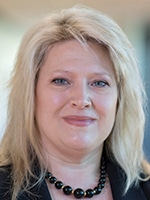April 2022—Staffing, supply chain, and significant supply price increases. Two continuing problems and one new. When Compass Group members met online March 1 with CAP TODAY publisher Bob McGonnagle, that trio of issues took center stage. Here’s what they had to say.
The Compass Group is an organization of not-for-profit IDN system laboratory leaders who collaborate to identify and share best practices and strategies.
Dwayne Breining, I want to get your initial reaction to a COVID-related transaction. It was announced that GeneDx has been acquired by one of the COVID startups, Sema4. Do you have any news about that?
Dwayne Breining, MD, executive director, Northwell Health Laboratories, New York: We know Sema4 has done a lot regarding COVID but they also do cytogenetics and other genetics testing. They started as a laboratory in New York City and had done work with Mount Sinai. They’ve since moved to Connecticut and are setting themselves up as a freestanding enterprise with a lot of talent behind it. They’ve been especially good at comparative genomic hybridization and esoteric things like that. We’ll see what develops, but it’s a significant consolidation in the marketplace for that type of testing.

Gauld
Lori Gauld, are staffing challenges more severe since the last time we got together?
Lori Gauld, executive director of pathology and laboratory medicine, Medical University of South Carolina: Staffing is about the same. We are struggling with wages. In our area, Target wages went up to $24 an hour, and we’re starting phlebotomists at $14 an hour. There are many challenges with working in a centralized downtown facility, among them the cost of parking. Systemwide we’re trying to address the wage gaps, and we’re using unique mechanisms, including a position that is essentially bachelor’s or master’s educated. It requires a lot more training and teaching basic lab skills. In terms of turnover, we’ve started to level off.
And COVID is not the crisis it once was?
Lori Gauld (MUSC): Correct. COVID is down again, and we’ve been able to deploy more antigen testing throughout the state. This has helped in terms of being able to manage in-lab testing.
Dan Ingemansen, what are your staffing challenges?
Dan Ingemansen, senior director, Sanford Health, Sioux Falls, SD: Staffing remains a challenge. Over the past two months or so we have seen an improvement in our ability to fill open positions. At the same time, we are filling positions with different qualifications, work levels, and skills. The staffing shortages have forced us to look differently at responsibilities and focus our medical laboratory scientists or medical laboratory technicians on testing activities and pull them away from the more routine responsibilities that a four-year biological science person or administrative staff can take on. This has forced us to re-look at the responsibilities of who does what moving forward.
Is there a promise in that of even greater yield than you are currently realizing?
Dan Ingemansen (Sanford Health): Absolutely. I think we’re going to be leaner and more efficient moving forward. For example, historically our infectious disease departments were completely staffed by technologists. We pulled the plating responsibilities and preanalytics from our technologists and brought in lab assistants to do that work, which we had not done in the past. I think our technical staff appreciated those changes because they’re able to read plates all day instead of doing setup.

Dr. McHardy
Ian McHardy, can you talk about your situation in California with regard to inflation and supply chain?
Ian McHardy, PhD, D(ABMM), director, microbiology, molecular, and immunology laboratory, Scripps Health, San Diego: We have very high gas prices in California, but I think we’re experiencing the same inflation shocks in contracts and sticker prices that everybody else is in the laboratory arena. We are again in the phase of suffering through supply chain shortages that are arising from places in China and other manufacturing centers that shut down during the Omicron surge or are continuing to shut down. We are facing shortages for elements like cuvettes for chemistry analyzers.
Winnie Carino, would you like to add anything?
Winnie Carino, MA, CLS, MT(ASCP), director of laboratory services, Scripps Health, San Diego: I’m seeing the most shortages with butterfly needles and Vacutainer tubes, specifically the lithium heparins and EDTAs. We’re working with alternative suppliers and possible alternative materials, but it’s not easy because they have to be the same materials we used when we validated our analyzers.

Brownell
Karen Brownell, are you also seeing supply chain disruption, despite the COVID relief on the frontline?
Karen Brownell, AVP, laboratory services, Intermountain Healthcare: We’re concerned about the Vacutainer situation, too, but we have been lucky in that our supply chain has done well in its demand planning. So we are holding status quo. We’ve looked for other vendors. We’ve also instructed our clinicians about not doing repeat testing if not warranted; for example, don’t do rainbow draws in the emergency department. We’ve talked to them about what they can do to help us conserve resources. We’re not at urgent status yet, but we’re watching it.
Mick Runnoe, can you comment on what’s going on at ACL Laboratories?
Mick Runnoe, VP of Laboratory Operations, ACL Laboratories, West Allis, Wis.: I find it interesting that while our central lab high-throughput PCR testing has declined as our positivity rate declined, the rapid PCR testing at our hospitals in our urgent care clinics has sustained—there’s still a need for rapid PCR testing at the point of care.
The good news is we’ve been able to achieve some volume of reagent for those tests. The avenues of inventory have opened up and we are able to keep some in the warehouse rather than distribute everything we get every week.
We’re seeing similar issues with tubes and needles, and we went to a variety of suppliers to try to bring those inventories back up and we’ve been fairly successful.
We haven’t had to stop doing testing or stop using any particular device. But we have experienced “I only have enough to last me until Monday” or “. . . until tomorrow.” As a large system, we’re able to share supplies across locations and state lines, so that helps us.
The challenges around staffing have lessened a little. The number of open positions is now less than the number we’re filling; we’re catching up to where we were. But we’ve also expanded our internal phlebotomy program, and we have a histology program that we’ve expanded into our Illinois region. Those are helping fill our roles as well.
You’re a big system; you represent a lot of patients and test volume. Did you notice the Labcorp and Ascension news? Because there are a lot of Ascension hospitals in the territory you share in Wisconsin and Illinois.
Mick Runnoe (ACL Laboratories): We have Ascension partners in our market in Wisconsin. My supervisors at the hospital laboratories have been getting phone calls from Ascension laboratory professionals seeking information about the jobs we have available. I imagine anytime there’s a large takeover of that nature, the team members, bench folks, and even supervisors get a little nervous about how long their job will last. We have seen some of that. And that helps us a little with our open positions.
Darlene Cloutier, what’s your reaction to what we’ve been discussing?
Darlene Cloutier, MSM, MT(ASCP), HP, director of laboratory operations, Baystate Health, Springfield, Mass.: It feels like I get a notification from our purchasing department every day that we have to find a substitute product for something. We’ve been able to manage and find an alternative supply, but it’s concerning to the lab staff because they worry about the need to revalidate.
COVID lab testing volumes are down at Baystate, and at this time there’s a significant shift to point-of-care testing. There’s also a movement to discontinue preprocedure testing at Baystate unless the patient requires an overnight stay in the hospital. That will eliminate even more of the testing in the labs.
In terms of the mergers and acquisitions, we are aware of the more recent activity. We haven’t heard about any recent efforts specific to Baystate, but it’s not like we don’t expect that conversation to be revisted at some time in the future.
Are you experiencing the problems of general consumer inflation as it’s affecting your staff?
Darlene Cloutier (Baystate): Yes, general consumer inflation is affecting everyone’s lives. We are feeling the impact of inflation with our supply costs. I was recently made aware of significant price increases on one of our contract renewals. In this case we had no option to negotiate pricing.
Julie Hess, what is your reaction to the consolidation news in the in vitro diagnostics and laboratory world?
Julie Hess, VP, laboratory services, AdventHealth, Orlando, Fla.: Whenever I hear about Labcorp or Quest coming into a hospital system, it gives me a quiver of fear because it feels so disconnected from what we in clinical labs feel are the foundation points—being connected to our stakeholders, the physicians, making sure it feels like there’s a patient at the end of every result. I don’t always get the sense of those things being important when it is outside the hospital or health care system.
 CAP TODAY Pathology/Laboratory Medicine/Laboratory Management
CAP TODAY Pathology/Laboratory Medicine/Laboratory Management
